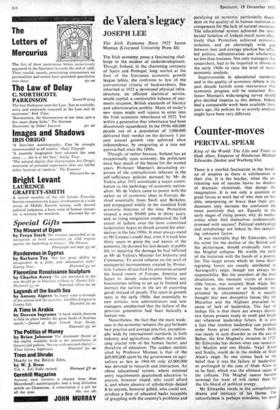de Valera's legacy
JOSEPH LEE
The Irish Economy Since -1922 James Meenan (Liverpool University Press £6) The Irish economy poses a fascinating chal- lenge to the student of underdevelopment. Though Ireland, in the chastening company of Spain and Portugal, long nestled at the foot of the European economic growth league tables, she conforms to few of the conventional criteria of backwardness. She inherited in 1922 a developed physical infra- structure, an efficient statistical service, ample capital, a comfortable balance of pay- ments situation, British standards of literacy and administrative probity. Many of today's new states might well rejoice to enter into the Irish economic inheritance of 1922. Yet within a generation that inheritance had been disastrously squandered. In the 1950s 400,000 people out of a population of 3,000,000 delivered their verdict on the derisory 1 per cent annual growth rate achieved since independence, by emigrating at a rate not approached since the 1880s.
Though, or rather because, Ireland has an exceptionally open economy, the politicians must bear much of the blame for the wasted years. Professor Meenan's devastating ex- posure of the contradictions inherent in the self-sufficiency policies pursued by Mr de Valera after 1932 constitutes a major contri- bution to the pathology of economic nation- alism. Mr de Valera came to power with the stalest set of economic ideas in Europe, de- rived essentially from Swift and Berkeley, and propagated widely in the standard Irish economic histories of the time. Protection created a mere 50,000 jobs in thirty years, and, as rising emigration emphasised the full extent of failure, even the most committed isolationists began to thresh around for alter- natives in the late 1950s. It must always stand to Mr Lemass's credit that, even if it took him thirty years to grasp the real nature of the economy, he devoted his last decade in public life to repairing the damage he had inflicted as Mr de Valera's Minister for Industry and Commerce. To avoid reliance on the pool of managerial incompetence created by Protec- tion. Lemass dispatched his emissaries around the board rooms of Europe, America and Japan to dangle inducements before any businessmen willing to set up in Ireland and instruct the natives in the art of exporting goods instead of people. The spurt in growth rates in the early 1960s, due essentially to new policies, new administrators and new managers, emphasised that the failure of the previous generation had been basically a human one.
Nevertheless, the fact that the main weak- ness in the economy remains the gap between best practice and average practice, exception- ally wide by international standards in both industry and agriculture, reflects the contin- uing crucial role of the human factor, and therefore of education. The saddest statistic cited by Professor Meenan is that of the £69,000,Q00 spent by the government on agri- culture as late as 1968-69 only £3,000,000 was devoted to research and instruction. An obese educational system, where minimal entry requirements guaranteed education to anyone, however stupid, who could afford it, and where absence of scholarships denied it to anyone, however gifted, who could not, produce a flow of educated hacks incapable of grappling with the country's problems and
paralysing an economy particularly depen- dent on the quality of its human resources to compensate for the lack of natural resources. The educational system achieved the intel- lectual isolation of Ireland much more effec- tively than Protection achieved economic isolation, and an alarmingly wide gap between best and average practice has afflic- ted politics, administration and scholarship no less than business. Not only managers, but researchers, had to be imported in di'oves in the early 1960s to raise the level of socio- economic analysis.
Improvements in educational standards and in the quality of economic debate in the past decade furnish some reassurance that economic progress will be . sustained. Pro- fessor Meenan's wide-ranging survey should give decided impetus to this debate. Indeed had a comparable work been available forty years ago, the policies he so acutely analyses might have been very different.






































 Previous page
Previous page